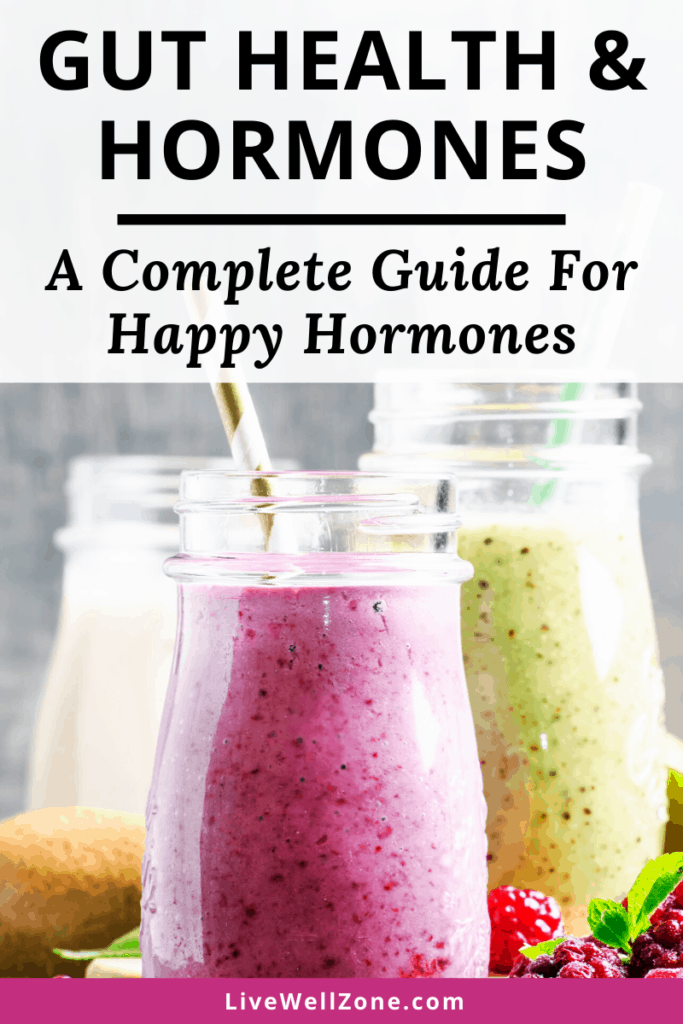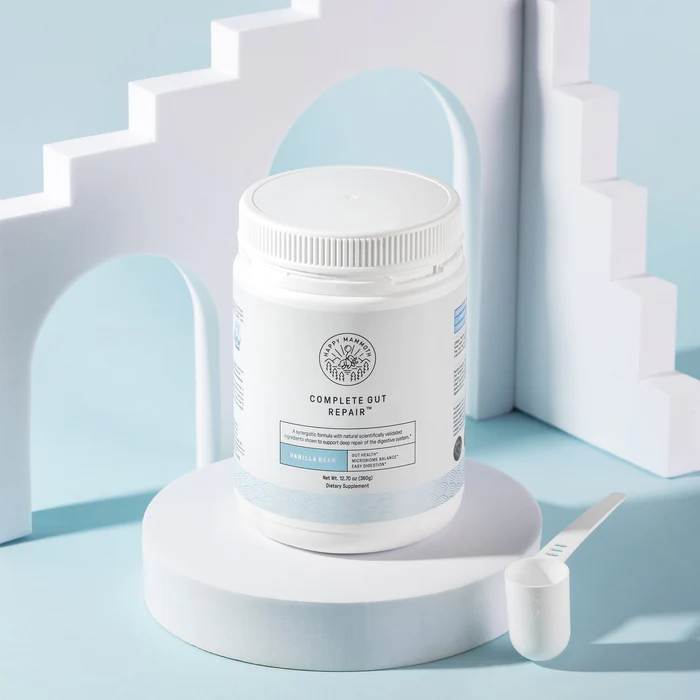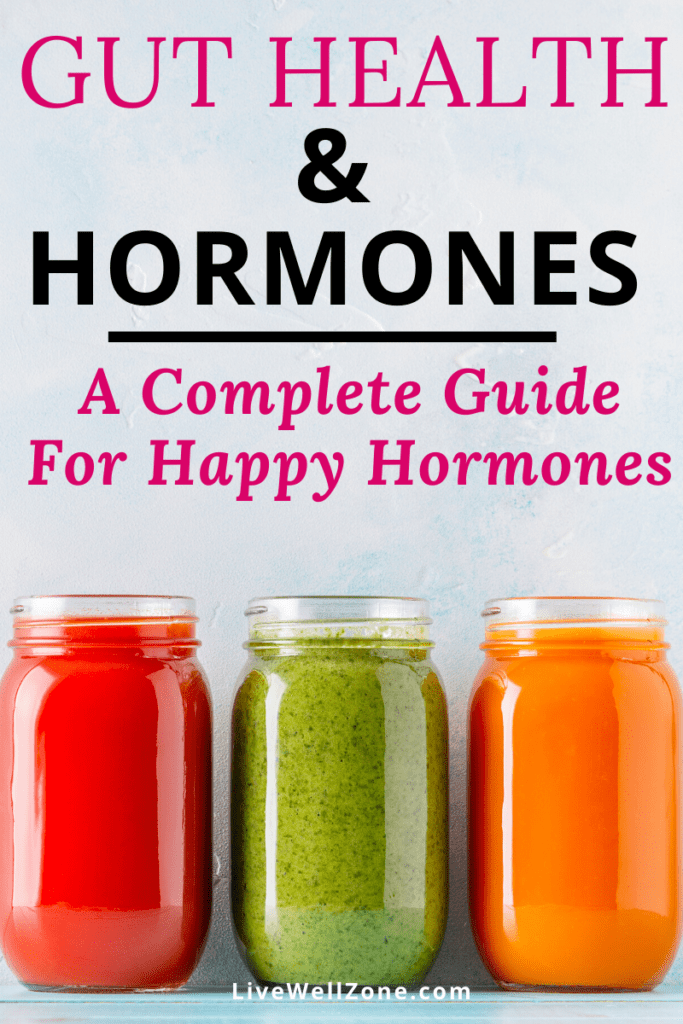
As our understanding of the human body continues to grow, it’s becoming more evident that the gut is the most important – and often, most neglected – part of the endocrine (hormone production) system.
In fact, understanding the link between gut health and hormones is like having perfect vision after spending your entire life living with blurred vision.
Yes, it’s that enlightening and empowering!
So, today I’m going to give you an overview of the gut and how you can give it some TLC in order to balance your hormones confidently.
More specifically, we are going to look at:
- which hormones are made in the gut.
- how gut bacteria (aka gut flora, gut microbiota or intestinal flora) regulate estrogen, melatonin, thyroid hormones and others.
- what you can do to support your gut (aside from the standard “take probiotics” advice)…
Let’s get to it!
NOTE: for the full list of research papers and other resources that were used to put together this post, see the “References” section at the end of this article.
HORMONES THAT ARE PRODUCED IN (OR REGULATED BY) THE GUT
The gut can potentially produce hundreds of different hormones that affect every single aspect of our health.
Now, I say “potentially” because the scientific community is still making new discoveries about our microbiome and its role in hormone regulation.
But even though research is always evolving, I’ve taken the time to summarize what we do know about the hormones that are produced by our gut flora
Below is a summary of those hormones (NOTE: for the medical references used in this section and the rest of the article, just go to the Reference section at the end of this post).
1. Neurotransmitters
Neurotransmitters are a class of hormones that includes:
Dopamine
- plays a role in bodily movements and emotional response.
- influences sleep, focus, memory, learning and mood.
Serotonin
- regulates mood.
- precursor to melatonin (which regulates sleep-wake cycle).
- influences mood, appetite, emotions and cognitive function.
Noradrenaline (aka norepinephrine)
- vital for fight or flight response.
- in response to fight or flight noradrenaline increases heart rate, blood pressure and the breakdown of fat.
- plays a role in sleep-wake cycle and cognitive health.
GABA (gamma aminobutyric acid)
- regulates communication between brain cells.
- plays a role in stress response, behavior and cognitive function.
- influences feelings of fear or anxiety, as well as sleep.
In terms of their production, these hormones can be produced by gut flora or indirectly regulated by the flora.
2. Gastrointestinal Hormones
The gastrointestinal hormones include:
Ghrelin
- protects hearts health.
- plays a role in insulin secretion.
- interacts with the hypothalamus (the master gland of the endocrine system).
- stimulates appetite.
Leptin
- regulates appetite and body weight.
- interacts with the hypothalamus.
Glucagon-like peptide-1
- stimulates insulin release and inhibits glucagon release (glucagon signals the body to release more glucose into the blood when blood sugar is low).
PYY
- released after eating.
- binds to receptors in the brain to reduce appetite and make us feel full.
- slows down the movement of food through the digestive tract.
In terms of the production of these hormones, they’re not produced by the gut.
Instead, their production is indirectly regulated by the gut.
3. HPA (Hypothalamic Adrenal Axis) Hormones
The HPA Axis is the pathway in the body that regulates how we respond to chemical, physical and emotional stress.
One of the most important HPA hormones is cortisol which is necessary for:
- lowering inflammation.
- healing wounds.
- metabolic function.
In terms of production, cortisol is produced by the adrenal glands, but it’s production is indirectly regulated by the gut.
WHAT IS THE ESTROBOLOME AND WHY IT MATTERS

There are various groups of microbes that regulate specific hormones. And one of the most important is the estrobolome.
If you’ve never heard of the estrobolome before, it’s a set of gut microbes that:
- metabolize estrogens (i.e. estrone, estradiol and estriol).
- balance the amount of estrogen circulating through the body.
- regulate how much estrogen is excreted from the body.
Because the estrobolome regulates estrogen, that means it influences estrogen-related conditions like breast cancer, excess weight gain, fibroids, endometriosis and PCOS (which also has an estrogen component to it).
So, how does the estrobolome actually help with estrogen balance?
Well, the estrobolome produces an enzyme called beta-glucuronidase, that converts estrogen to its active form.
Once active, estrogen is able to bind to the appropriate receptors in the body and influence various estrogen-dependent processes.
And as you can imagine your estrobolome works well only when your entire gut is also well.
This means that if your gut is populated with a diverse number of healthy bacteria, the estrobolome works well.
However, if there is gut dysbiosis (i.e. imbalance in your gut flora) then estrobolome functions are thrown.
In concrete terms, this means that levels of the beta-glucuronidase enzyme will change and the enzyme won’t work as effectively.
As a result of this, an imbalance of your gut microbiota can lead to one of these two outcome:
- too much total estrogen.
- too little total estrogen.
In addition, gut dysbiosis contributes to an imbalance in the individual levels of each estrogen, as well as an imbalance between estrogen and other hormones (such as progesterone and testosterone).
As you can see everything is connected and it’s no surprise that having an unhealthy gut (and estrobolome) can contribute to lots of different symptoms.
To help illustrate this, here are some symptoms and conditions that have been linked to estrobolome disruption:
- increased androgen production and lower estrogen levels in women with PCOS.
- higher levels of estrogen and inflammation in women with endometriosis. This results from excess levels of beta-glucuronidase in the estrobolome of women with endometriosis. Too much beta-glucuronidase means more estrogen stays in the body and not enough is excreted.
- decreased bone density, heart problems and obesity in postmenopause.

HOW GUT HEALTH AFFECTS OTHER HORMONES
Thyroid Hormones and The Gut
Whenever we have thyroid issues, the first step is usually to treat the thyroid itself.
But for some people, simply addressing the thyroid doesn’t provide much improvement.
And this could be due to the fact that there are underlying gut health issues that are disrupting thyroid function.
For example, some research shows that people who don’t have a diverse set of gut bacteria, tend to have higher TSH levels (source).
Now, TSH is a hormone (released by the pituitary gland) that signals the thyroid to produce more T3 and T4.
So, if you have too much TSH your thyroid ends up producing more T3 and T4, which can then lead you to hyperthyroidism.
Research also indicates that people with hyperthyroidism have an imbalance of certain bacterial strains, such as:
- low levels of bifidobacterium and lactobacillus.
- high levels of enterococcus.
Now you may be wondering, “but what about hypothyroidism and the gut? Is there a link?”
Well, I wasn’t able to find a study that dives into the specifics of low thyroid function and the gut. However:
- Hashimoto’s disease – which accounts for the majority of hypothyroidism cases in the U.S – is classified as an autoimmune condition. And 70% of our immune system resides in the gut. So, if the gut is off balance, then the immune system is more likely to be “off balance” too. This might contribute to more auto-immune conditions.
- If hyperthyroidism is not treated or addressed correctly, then it can eventually become hypothyroidism (your thyroid basically becomes fatigued from overworking and swings to the other extreme).
- The thyroid produces mostly T4 (inactive) and a little bit of T3 (active). In order for that T4 to become active it has to be converted to T3. And the gut is responsible for 20% of the T4 to T3 conversion! So, if the gut is not in good enough health to take care of that 20%, that’s enough to throw your body into disarray (side note: the other majority of T4 to T3 conversion occurs in the liver).
Melatonin and The Gastrointestinal System
As we saw in the very first section of this post, serotonin is produced in the gut and it is also the precursor to melatonin.
Now, as for melatonin it regulates our circadian rhythm (influencing when you fall asleep and when you wake up).
And on the flip side, studies also indicate that the health of our intestinal flora directly impacts our circadian rhythm.
In fact, one specific species of bacteria called enterobacter aerogenes, increases as melatonin production increases (source).
As a result of this, scientists speculate that our circadian clock and bacterial “clocks” are very closely intertwined!
Stress, Cortisol and The GI Tract
Pathogens like c. rodentium and salmonella, are known to increase the levels of hormones like epinephrine and norepinephrine (source).
Now, normally the body releases these hormones in response to stress and inflammation (such as invasion by a pathogen).
However, as those hormones are continually released, the bacteria take note of those rising levels…which then triggers those bacteria to become more virulent!
And…let’s not forget that cortisol is another hormone that the body releases in response to to stress.
But once again, this can come with unwanted side effects when we’re talking about chronic stress because:
- cortisol production is stimulated by CRH (corticotropin releasing hormone).
- CRH has the ability to weaken the gut lining, which can then lead to leaky gut syndrome.
TIPS FOR MAINTAINING A HEALTHY GUT AND HORMONES
Now that we’ve covered the nitty gritty stuff, let’s get down to real-life action steps that you can take to support your gut lining, your flora and their communication with the rest of the body.
1. Add Probiotics and Prebiotics to Your Hormone Balance Diet

Probiotics are the live bacteria that reside in the gut while prebiotics are the food or fertilizer that make probiotics grow.
You can get both from supplements and from food.
Starting off with probiotics, some of the best food sources are:
- yogurt
- kombucha
- kimchi
- tempeh
- miso
- kefir
- natto
- sauerkraut (must be unpasteurized in order to get the health benefits)
As for prebiotics, they are soluble fibers that are found in food. Examples of these soluble fibers include pectin (found in apples, pears, cherries and other foods) and beta-glucans (found in seaweed, oats, mushrooms and other foods).
The main thing to remember here is that all foods – fruits, veggies, grains, legumes – contain different types of soluble fibers (i.e. prebiotics).
So, the more whole foods you eat, and the more variety you have in your diet, then the more diversified and healthy your gut bacteria will be.
As for probiotic supplements, some are marketed for general health, while others are marketed for specific conditions.
Overall, I always like to go with a probiotic that is intended for general health.
After all, when our hormones are off, many other aspects of our general health are off too.
So, to avoid having too many supplement bottles in your medicine cabinet, I suggest taking a general health probiotic.
Please keep in mind that like all supplements, probiotics are an add-on to a healthy diet and lifestyle. They’re not a substitute for a poor diet and lifestyle.
So, make sure to work toward a healthy diet while also taking these supplements.
For a detailed shopping list and starter recipes, be sure to read this post on what to include in a hormone-balancing diet plan, as well as this post on what to drink for your hormones.
2. Consider Using a Supplement for Gut Support
There’s no doubt that gut health starts with our every day food choices.
However, it doesn’t hurt to support your body with a supplement while you work on building long-term diet and lifestyle habits.
In addition, a good supplement can you the quick jumpstart and motivation that you need to stay on the healthy path 🙂
One supplement I suggest investigating for yourself is Complete Gut Repair.

This supplement is made with ingredients that can help with leaky gut and with supporting a healthier microbiome, such as:
- Collagen peptides.
- Glycine, an amino acid that supports healthy collagen levels.
- VItamin C, one of the key ingredients that the body needs to make collagen.
- Probiotics.
- Prebiotics.
3. Swap Artificial Sweeteners for Natural Sweeteners

Consuming refined sweeteners (such as high fructose corn syrup and refined cane sugar) is a surefire way to raise inflammation and disrupt the delicate balance of your flora.
Better alternatives are natural sweeteners such as:
- raw honey
- maple syrup
- natural green stevia (white stevia is processed)
4. Avoid Common Allergens
Many common allergens like soy, corn, wheat and dairy place a lot of stress on the body.
And that added stress increases inflammation which then messes with your gut lining and gut flora.
So, it’s a good idea to give your break and stay away from them for a while.
Now, how long “a while” is really varies from one person to another.
But you want to plan for at least a 21-day break.
For many people, simply removing these allergens from their diet leads to rapid improvements in inflammation and gut health.
So, give it a try and see how it works for you.
5. Heal and Seal Your Gut With Bone Broth

When it comes to healing and sealing the gut lining, bone broth is one of the most potent at-home remedies you can use.
The most powerful and nutrient-dense bone broth is made from cow bones (although chicken and fish bones can also be used) that are slowly simmered with various herbs for several hours.
That slow simmering process releases a ton of nutrients that are soothing for the gut and the rest of the body.
As a result bone broth is packed with minerals such as:
- magnesium
- iron
- calcium
- potassium
- zinc
In addition, bone broth contains collagen. This is very significant because collagen is the main component of your gut lining. And in order to strengthen and seal the gut lining, you need sufficient amounts of collagen.
So, regular consumption of bone broth gives you a variety of minerals as well as a direct source of collagen to heal your intestinal lining.
6. Avoid Pesticide-Heavy Foods When Possible
Pesticides are problematic because they:
- are estrogen-based and therefore contribute to the amount of excess estrogen in your system.
- contribute to leaky gut and microbiome changes.
Therefore, make it a priority to reduce your consumption of pesticides.
If budget is a concern, then start with the foods that have been shown to contain the most pesticide levels.
You can get the list from this page on the EWG website.
Save it to your phone and then start buying these in organic form only.
7. Reduce Exposure to Toxins or Inflammatory Compounds
Toxins create inflammation that affects your gut lining and your microbial population.
And the main sources of toxins are food, water, cosmetics and personal care products.
For most people, the most important place to start when reducing toxins is food.
This means avoiding:
- pesticides
- growth hormones
- processed meats
- highly refined or processed foods (store bought chips, cookies, crackers, etc.)
- sugary drinks
- trans fats
- refined or GMO oils (canola, soybean, corn)
- excessive alcohol
Once there are holes in the lining of your gut (i.e. leaky gut) the only way to heal it is to stay away from the above items.
Also, it’s important to avoid foods that are difficult to digest. This is because you need really healthy bacteria in order to digest them…and your body must heal first.
One of the major “hard-to-digest” foods is meats. Beef, chicken, lamb, etc…avoid them while healing your gut.
Instead, you can:
- eat some fatty fish from time to time since it anti-inflammatory essential fatty acids.
- drink bone broth because it contains nutrients that nourish the gut lining.
8. Pamper Yourself
Our gut flora influence every aspect of our lives. And every aspect of our lives also affects the gut.
So, healing your gut is really about self care.
This means that you want to pamper yourself every chance you get!
And I’m not just talking about relaxing baths.
I’m also talking about:
- eating nutrient-dense foods that nourish your cells.
- getting enough sleep.
- meditating to help you de-stress.
- exercising to blow off steam and improve circulation.
Basically, any healthy habits that support your well-being will also support your gut.
If you need ideas or inspiration for self care and leading a healthy lifestyle, check out this post on starting a self care routine for hormone balance, as well as these easy breakfast ideas for hormone balance.

RELATED QUESTIONS
Can probiotics increase estrogen?
Probiotics help to improve the health of the gut. Since microbes in the gut regulate hormones, this means that all hormones (not just estrogen) are impacted by the use of probiotics.
Whether estrogen goes up or down will depend on the natural self-adjustment that the body does (not by the probiotics themselves having an estrogenic or anti-estrogenic effect).
CONCLUSION
The gut-hormone connection is a vast topic that people spend their entire lives studying.
We’ve barely skimmed the surface in this post!
However, I hope that this overview has given you more insight into the magical microbial world that exists in you.
I have plenty of free resources on this blog to help you balance your hormones naturally. So be sure to take advantage of them by visiting my hormone balance collection.
If you have any questions or comments about this topic, don’t hesitate to share your feedback below 🙂
Additional References:
https://academic.oup.com/mend/article/28/8/1221/2623221
https://chopra.com/articles/the-estrobolome-how-the-gut-impacts-estrogen-levels-metabolism-and-more
https://www.medicalnewstoday.com/articles/320637
https://www.medicalnewstoday.com/articles/232248
https://www.hormone.org/your-health-and-hormones/glands-and-hormones-a-to-z/hormones/norepinephrine
https://www.everydayhealth.com/gaba/guide/
https://www.yourhormones.info/hormones/ghrelin/
https://www.yourhormones.info/hormones/leptin/
https://www.yourhormones.info/hormones/peptide-yy/
https://www.ncbi.nlm.nih.gov/pubmed/27040468
https://www.huffpost.com/entry/prebiotics-probiotics_b_3430788
https://www.healthline.com/nutrition/19-best-prebiotic-foods



I love this!!! This is so good…gonna try and live a better healthier life it’s hard when you boyfriend eats McDonald’s and Wendy’s all the time.
It’s tricky finding the right balance. If you can get him on board to make some changes with you, definitely makes it easier 🙂 And you can keep each other motivated too!
I would love to connect with people with health goals ! My health has not been the best for 6 yrs after having my daughter in my forties . Thank you